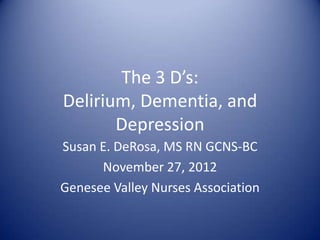
The 3 ds 11 27 2012_presentation1
- 1. The 3 D’s: Delirium, Dementia, and Depression Susan E. DeRosa, MS RN GCNS-BC November 27, 2012 Genesee Valley Nurses Association
- 2. Objectives • Define Delirium, Dementia, and Depression • Describe the signs and symptoms of the 3 D’s in the older adult • Identify the nurse’s role in identifying risk and interventions
- 3. It seems so basic… • Individualized care • Knowing the baseline • Listening • Consistency
- 4. Impact from any one of the 3 D’s • Health care economics • The older adult • The family • The primary care provider and staff
- 6. S & S of Delirium • Acute onset • Inattention • Disorganized thinking • Altered state of consciousness
- 7. Risk Factors for Delirium • 75 years or older • Dementia • Infection • Polypharmacy • Poor sleep • Relocation • Electrolyte imbalance • Surgery
- 8. Confusion Assessment Method (CAM) acute onset & inattention plus either or both… disorganized altered level thinking of consciousness
- 9. Delirium Interventions • Review of meds • Pain management • Sleep quality • Fluids/nutrition • Sensory aids • Physical and mental activity • Family involvement • NO restraints
- 10. What could you do instead of this phone call?
- 11. Expected Outcomes • Absence of delirium • Cognitive status returned to baseline • Functional status returned to baseline • Discharged to same destination at pre- hospitalization
- 12. Alzheimer’s Dementia • Slow onset-over years • Stable symptoms • Persistent memory changes • Alert and stable level of consciousness • Sleep fragmented
- 13. Alzheimer’s Dementia Proposed Stages • Preclinical • Mild cognitive impairment • Dementia-includes the current stages of mild, moderate, and severe
- 14. Risk Factors for Dementia • Advancing age, but not normal aging • First degree relative • Apolipoprotein e4 (APOE-e4) gene • Mild cognitive impairment with memory problems • Cardiovascular disease risk factors • Social engagement and diet • Head trauma and traumatic brain injury
- 15. Mini-Cog Assessment • Composed of 3 item recall and Clock Drawing Test
- 16. Intervention for Alzheimer’s Dementia • Individualized • Pre-planning • Change of intervention with disease progression • Appropriate use of tx options • Good management of coexisting conditions • Coordinated care with related communication
- 17. Expected Outcomes • Older adult independent & functional in environment of choice for as long as possible • Co-morbid conditions well managed • Distressing symptoms minimized & controlled
- 18. Depression • Syndrome with multiple causes with symptoms of affective, cognitive, somatic and/or physical manifestations
- 19. S & S of Depression • Mood change • Loss of interest • Weight gain or loss • Sleep disturbance • Fatigue and loss of energy • Diminished concentration • Suicidal thoughts
- 20. Risk factors for Depression • Alcohol/substance abuse • Co-morbid conditions • Functional disabilities • Social isolation • Loss • Side effect of medications
- 21. Interventions for Depression • Monitor & promote nutrition, elimination, sleep/rest patterns, pain management • Promote physical function • Social support • Maximize self efficacy • Structure of daily activities • Safety precautions as necessary
- 22. Expected Outcomes • Safety maintained • Reduction in symptoms • Daily function improves
- 23. Barriers to Implementing the Care Plan
- 24. Resources www.consultgerirn.org geriatric protocols. On this site you will find the “Try This” series: – Confusion Assessment Method – Geriatric Depression Screen – Assessing and Managing Delirium in Persons with Dementia – Mental Status Assessment of Older Adults: the Mini-Cog
Notes de l'éditeur
- The economics---in billions for each D. It ranges from the uncompensated family caregiver to the extended stay in the hospital or the need for long term care because the older adult can’t be at home anymoreThe older adult- any change in mental and emotional status eventually impacts the functional status. It is the level of independence in function that determines living situation, belief in self, quality of life , and sometimes length of life
- sleep/wake cycle can be reversedhypoactive/hyperactive mixed/fluctuating coursecan be anxiety, anger, agitationHowever, the majority are hypoactive….the quiet ones…..who slip or fall to the floor, wander, don’t eat although capable, etc. What else have you seen?
- CAM- importance of, frequencyInterventions:
- meds such as anticholinergics, opiods, etc.some hospitals have an informational brochure on delirium and check and see if a data sheet completed by pt/family on patterns, habits, routines.
- develops as a result of multiple factors rather than a single causeAlzheimer’s is a continuum with the individual showing changes as the brain deteriorates and is no longer able to compensate for the neuronal damage.
- prior to this proposal we had the mild/early stage, the moderate/mid stage and the severe/late stage. New technologies are providing some opportunity to diagnose earlier. preclinical –no detectable memory loss, early changes in brain identified, cerebrospinal fluid and/or blood (biomarkers) .May be seen as many as 20 years before symptoms Mild cognitive impairment-mild, noticeable to older adult and family, however, doesn’t impact ability to carry out every day activity. 10-20% of people over 65 have MCI. nearly half of people who visit their doctor about MCI develop dementia in next 3-4 years. Not all older adults with MCI go on to develop dementiabiomarkers: level of beta-amyloid accumulation in the brain and nerve cells in the brain are injured or actually degenerating.developing “disease modifying treatments that would be effective during preclinical and MCI stages.dementia
- 48% of those > 85 yo have dementiaAPOE-e4 is one of 3 common forms that carries cholesterol in the bloodstreamCV risk factors: inactivity, diabetes, smoking, obesity can impact brain health.
- No medications available to slow or stop the progression. the current medications temporarily improve symptoms
- A treatable health condition.
- psychomotor slowing or agitation